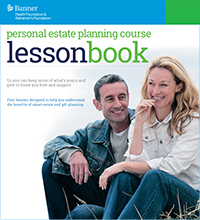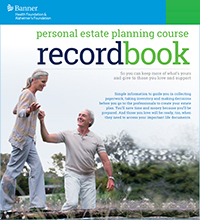Will, Trust, or Estate Plan: Which One is Right for You?
02/28/2020

The free comprehensive Estate
Planning Starter Kit provided by the
Banner Health Foundation will
help you understand the
benefits of smart estate planning.
Did you know that some 55% of American adults do not have a will or living trust to carry out their estate plans? Without a will, your state’s laws—rather than you—will determine what happens to everything you own, as well as your minor children, upon your passing. While a professional advisor, such as an estate planning attorney, can guide you through the process, here are a few basic descriptions about the types of documents you might wish to establish:
- Will. A last will and testament is a relatively simple, legally binding document that gives you control of what happens to your property and assets when you pass away. It makes the management of your assets clear and makes the process easier on everyone involved. From minimizing family conflict to eliminating lengthy court proceedings, having a will in place is a last gift to your loved ones.
- Estate Plan: A comprehensive estate plan contains much more than just your will. Not only does it deal with the distribution of assets and legacy wishes, but it may help you and your heirs pay substantially less in taxes, fees, and court costs. Your estate plan should include a power of attorney, an advance directive, and, if you so choose, trusts for your children and grandchildren, gifts to favorite charities, and even plans for the care of pets.
- Living Trust. As part of your estate plan, you can also create a living trust, a written legal document through which your assets are placed into a trust for your benefit during your lifetime, and then transferred to designated beneficiaries at your death.

Getting Started
Before you meet with your professional advisor, take a few moments to download the free comprehensive estate planning kit provided by the Banner Health Foundation. The kit includes a lesson book to help you understand the benefits of smart estate planning and an electronic personal record book that you can complete and bring to your professional advisor to help create your plan.
And remember, as part of your plan, you can include a legacy charitable gift to Banner Health, a nonprofit, to support the hospital or patient program that is most meaningful to you. To explore planned giving options and learn how other donors have left a charitable legacy within Banner Health, visit the Planned Giving Center.
We’re happy to help you start the planning process or answer any questions you have along the way. Feel free to contact Pat Elder, Chief Development Officer for Planned Giving, at patricia.elder@bannerhealth.com or 602.747.4485.

